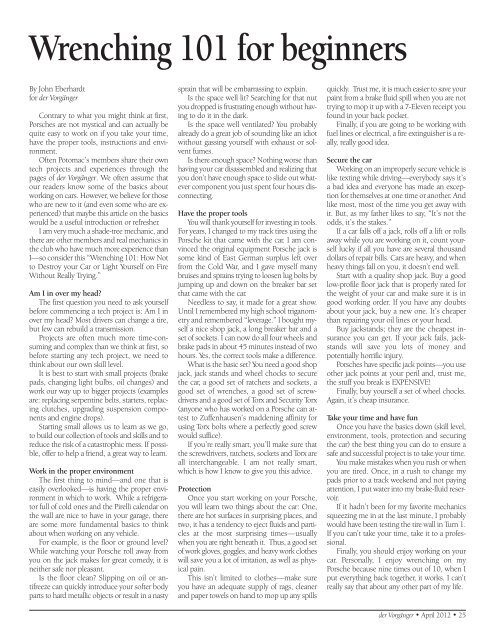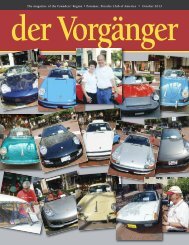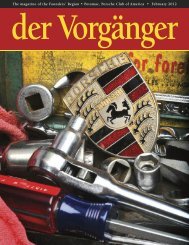Create successful ePaper yourself
Turn your PDF publications into a flip-book with our unique Google optimized e-Paper software.
Wrenching 101 for beginners<br />
By John Eberhardt<br />
for der Vorgänger<br />
Contrary to what you might think at first,<br />
<strong>Porsche</strong>s are not mystical and can actually be<br />
quite easy to work on if you take your time,<br />
have the proper tools, instructions and environment.<br />
Often Potomac’s members share their own<br />
tech projects and experiences through the<br />
pages <strong>of</strong> der Vorgänger. We <strong>of</strong>ten assume that<br />
our readers know some <strong>of</strong> the basics about<br />
working on cars. However, we believe for those<br />
who are new to it (and even some who are experienced)<br />
that maybe this article on the basics<br />
would be a useful introduction or refresher.<br />
I am very much a shade-tree mechanic, and<br />
there are other members and real mechanics in<br />
the club who have much more experience than<br />
I—so consider this “Wrenching 101: How Not<br />
to Destroy your Car or Light Yourself on Fire<br />
Without Really Trying.”<br />
Am I in over my head?<br />
The first question you need to ask yourself<br />
before commencing a tech project is: Am I in<br />
over my head? Most drivers can change a tire,<br />
but few can rebuild a transmission.<br />
Projects are <strong>of</strong>ten much more time-consuming<br />
and complex than we think at first, so<br />
before starting any tech project, we need to<br />
think about our own skill level.<br />
It is best to start with small projects (brake<br />
pads, changing light bulbs, oil changes) and<br />
work our way up to bigger projects (examples<br />
are: replacing serpentine belts, starters, replacing<br />
clutches, upgrading suspension components<br />
and engine drops).<br />
Starting small allows us to learn as we go,<br />
to build our collection <strong>of</strong> tools and skills and to<br />
reduce the risk <strong>of</strong> a catastrophic mess. If possible,<br />
<strong>of</strong>fer to help a friend, a great way to learn.<br />
Work in the proper environment<br />
The first thing to mind—and one that is<br />
easily overlooked—is having the proper environment<br />
in which to work. While a refrigerator<br />
full <strong>of</strong> cold ones and the Pirelli calendar on<br />
the wall are nice to have in your garage, there<br />
are some more fundamental basics to think<br />
about when working on any vehicle.<br />
For example, is the floor or ground level?<br />
While watching your <strong>Porsche</strong> roll away from<br />
you on the jack makes for great comedy, it is<br />
neither safe nor pleasant.<br />
Is the floor clean? Slipping on oil or antifreeze<br />
can quickly introduce your s<strong>of</strong>ter body<br />
parts to hard metallic objects or result in a nasty<br />
sprain that will be embarrassing to explain.<br />
Is the space well lit? Searching for that nut<br />
you dropped is frustrating enough without having<br />
to do it in the dark.<br />
Is the space well ventilated? You probably<br />
already do a great job <strong>of</strong> sounding like an idiot<br />
without gassing yourself with exhaust or solvent<br />
fumes.<br />
Is there enough space? Nothing worse than<br />
having your car disassembled and realizing that<br />
you don’t have enough space to slide out whatever<br />
component you just spent four hours disconnecting.<br />
Have the proper tools<br />
You will thank yourself for investing in tools.<br />
For years, I changed to my track tires using the<br />
<strong>Porsche</strong> kit that came with the car. I am convinced<br />
the original equipment <strong>Porsche</strong> jack is<br />
some kind <strong>of</strong> East German surplus left over<br />
from the Cold War, and I gave myself many<br />
bruises and sprains trying to loosen lug bolts by<br />
jumping up and down on the breaker bar set<br />
that came with the car.<br />
Needless to say, it made for a great show.<br />
Until I remembered my high school triganometry<br />
and remembered “leverage.” I bought myself<br />
a nice shop jack, a long breaker bar and a<br />
set <strong>of</strong> sockets. I can now do all four wheels and<br />
brake pads in about 45 minutes instead <strong>of</strong> two<br />
hours. Yes, the correct tools make a difference.<br />
What is the basic set? You need a good shop<br />
jack, jack stands and wheel chocks to secure<br />
the car, a good set <strong>of</strong> ratchets and sockets, a<br />
good set <strong>of</strong> wrenches, a good set <strong>of</strong> screwdrivers<br />
and a good set <strong>of</strong> Torx and Security Torx<br />
(anyone who has worked on a <strong>Porsche</strong> can attest<br />
to Zuffenhausen’s maddening affinity for<br />
using Torx bolts where a perfectly good screw<br />
would suffice).<br />
If you’re really smart, you’ll make sure that<br />
the screwdrivers, ratchets, sockets and Torx are<br />
all interchangeable. I am not really smart,<br />
which is how I know to give you this advice.<br />
Protection<br />
Once you start working on your <strong>Porsche</strong>,<br />
you will learn two things about the car: One,<br />
there are hot surfaces in surprising places, and<br />
two, it has a tendency to eject fluids and particles<br />
at the most surprising times—usually<br />
when you are right beneath it. Thus, a good set<br />
<strong>of</strong> work gloves, goggles, and heavy work clothes<br />
will save you a lot <strong>of</strong> irritation, as well as physical<br />
pain.<br />
This isn’t limited to clothes—make sure<br />
you have an adequate supply <strong>of</strong> rags, cleaner<br />
and paper towels on hand to mop up any spills<br />
quickly. Trust me, it is much easier to save your<br />
paint from a brake fluid spill when you are not<br />
trying to mop it up with a 7-Eleven receipt you<br />
found in your back pocket.<br />
Finally, if you are going to be working with<br />
fuel lines or electrical, a fire extinguisher is a really,<br />
really good idea.<br />
Secure the car<br />
Working on an improperly secure vehicle is<br />
like texting while driving—everybody says it’s<br />
a bad idea and everyone has made an exception<br />
for themselves at one time or another. And<br />
like most, most <strong>of</strong> the time you get away with<br />
it. But, as my father likes to say, “It’s not the<br />
odds, it’s the stakes.”<br />
If a car falls <strong>of</strong>f a jack, rolls <strong>of</strong>f a lift or rolls<br />
away while you are working on it, count yourself<br />
lucky if all you have are several thousand<br />
dollars <strong>of</strong> repair bills. Cars are heavy, and when<br />
heavy things fall on you, it doesn’t end well.<br />
Start with a quality shop jack. Buy a good<br />
low-pr<strong>of</strong>ile floor jack that is properly rated for<br />
the weight <strong>of</strong> your car and make sure it is in<br />
good working order. If you have any doubts<br />
about your jack, buy a new one. It’s cheaper<br />
than repairing your oil lines or your head.<br />
Buy jackstands; they are the cheapest insurance<br />
you can get. If your jack fails, jackstands<br />
will save you lots <strong>of</strong> money and<br />
potentially horrific injury.<br />
<strong>Porsche</strong>s have specific jack points—you use<br />
other jack points at your peril and, trust me,<br />
the stuff you break is EXPENSIVE!<br />
Finally, buy yourself a set <strong>of</strong> wheel chocks.<br />
Again, it’s cheap insurance.<br />
Take your time and have fun<br />
Once you have the basics down (skill level,<br />
environment, tools, protection and securing<br />
the car) the best thing you can do to ensure a<br />
safe and successful project is to take your time.<br />
You make mistakes when you rush or when<br />
you are tired. Once, in a rush to change my<br />
pads prior to a track weekend and not paying<br />
attention, I put water into my brake-fluid reservoir.<br />
If it hadn’t been for my favorite mechanics<br />
squeezing me in at the last minute, I probably<br />
would have been testing the tire wall in Turn 1.<br />
If you can’t take your time, take it to a pr<strong>of</strong>essional.<br />
Finally, you should enjoy working on your<br />
car. Personally, I enjoy wrenching on my<br />
<strong>Porsche</strong> because nine times out <strong>of</strong> 10, when I<br />
put everything back together, it works. I can’t<br />
really say that about any other part <strong>of</strong> my life.<br />
der Vorgänger • <strong>April</strong> 2012 • 25









